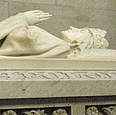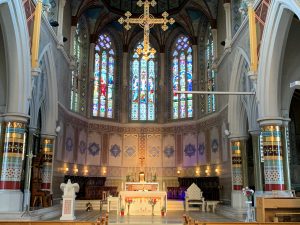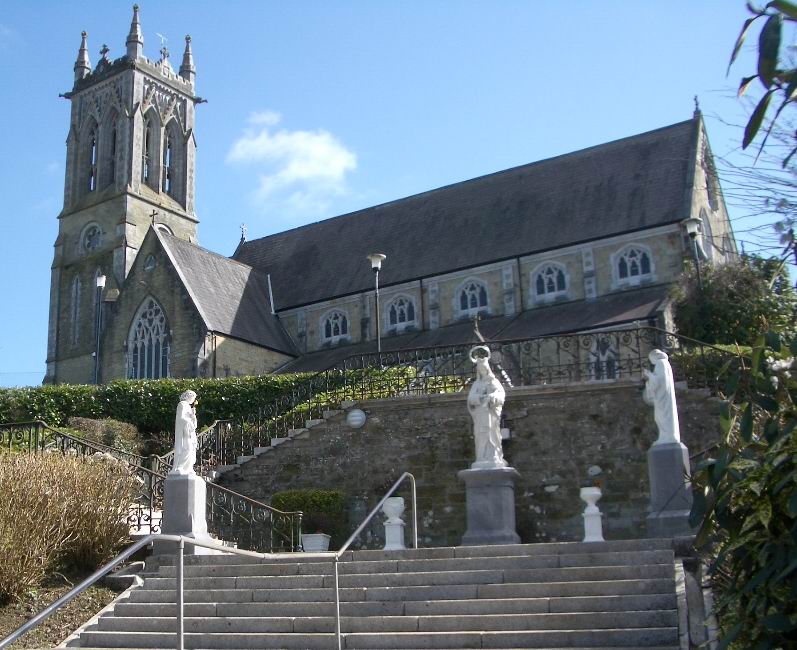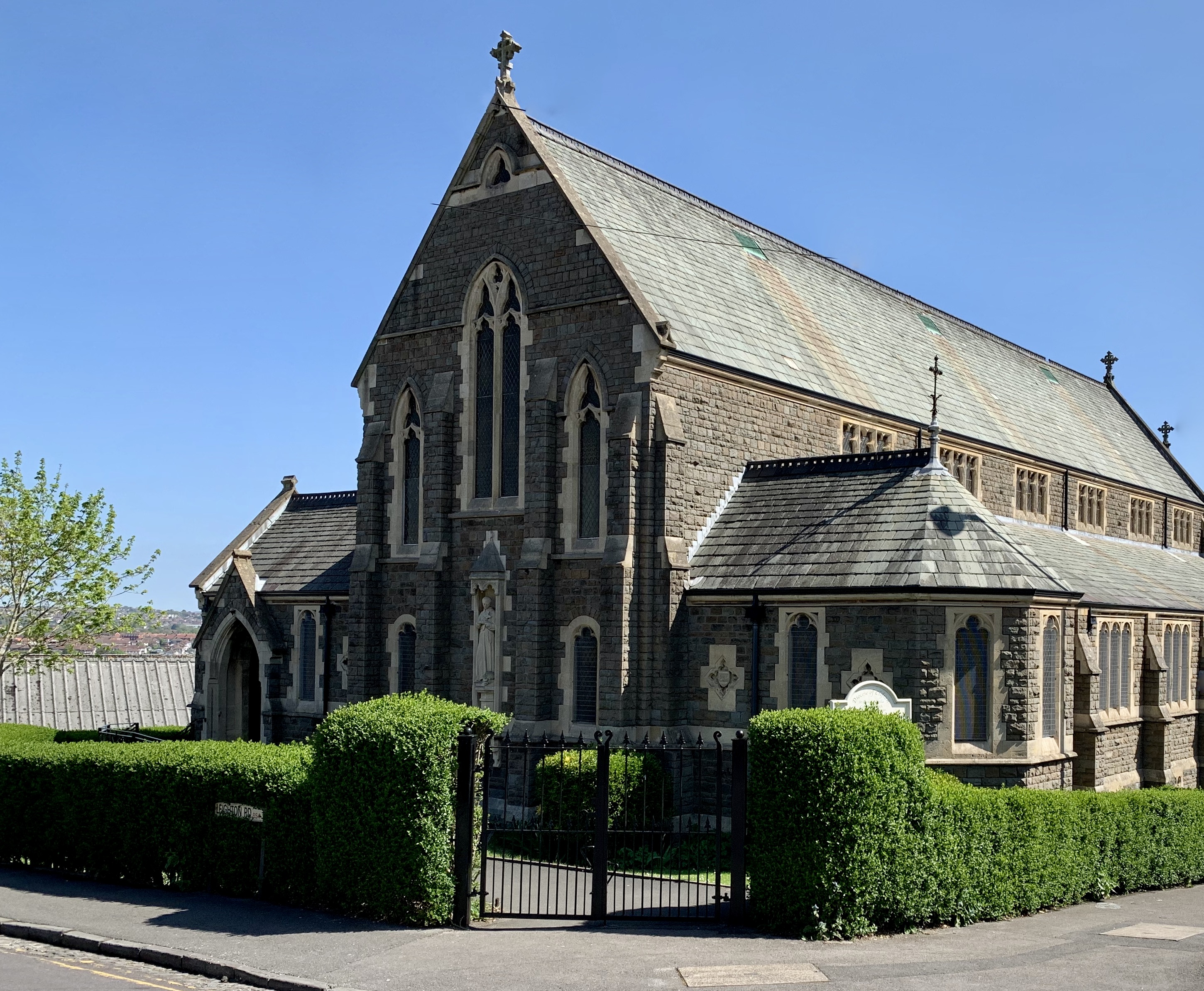Churches of the Day
Pictorial Thought for Today

Jul 18 - St Hedwig (1374-1399) Polish queen
 The tomb of Queen Hedwig lies in the Cathedral of Saints Wenceslas and Stanisalus on the Wawel Hill in Cracow. Through her marriage with Jagiello, duke of Lithuania, she was able to extend Christianity in the regions east of Poland and support the churches there. She was canonised by Pope John Paul II during his visit to Cracow in 1997.
The tomb of Queen Hedwig lies in the Cathedral of Saints Wenceslas and Stanisalus on the Wawel Hill in Cracow. Through her marriage with Jagiello, duke of Lithuania, she was able to extend Christianity in the regions east of Poland and support the churches there. She was canonised by Pope John Paul II during his visit to Cracow in 1997. Patrick Duffy tells what is known about her.
Betrothal at the Age of One
Hedwig (Jadwiga) was the daughter of the king of Hungary and Poland and when she was one year old she was betrothed to Wilhelm, the Hapsburg heir of Austria. She went to Vienna to learn the way of the Austrian court, but when her elder sister Catherine died, her father chose Hedwig as his heir to the throne of Hungary. He died when she was eight, but the Hungarians preferred her sister, Maria, who had already been accepted as queen of Poland by the nobles. Maria was then rejected by both countries and the archbishop of Krakow crowned Hedwig as "Jadwiga, king of Poland" (meaning she was the heir and not just the king's consort) in 1384, when she was ten.
Married to Jagiello at Twelve
The Polish nobles then set aside the vows made by proxy between her and Wilhelm and decided that she should marry Jagiello, duke of Lithuania and Ruthenia, who promised to become a Christian. The wedding took place in Krakow Cathedral in February 1386, after Jagiello and his brothers and the leading Lithuanian nobles were baptised. She was twelve and he was thirty-six. Jagiello was crowned king of Poland as Ladislaus (Władysław) II. As a monarch, young Hedwig probably had little actual power, but she was actively engaged in her kingdom's political, diplomatic and cultural life and acted as the guarantor of Ladislaus's promises to reclaim Poland's lost territories.
Slanders
The Hapsburgs circulated rumours that she and Wilhelm had already consummated a marriage when he had visited her to persuade her to marry him. These rumours were spread abroad by the Teutonic Knights, and she was denounced as an adulteress and a bigamist. They were even repeated in the writings of the scholar Aeneas Silvius Piccolomini, who later became Pope Pius II (1458-64), and great damage was done to her reputation outside Poland.

Christianisation of Lithuania
Jagiello/Ladislaus II decreed that the people of Lithuania should be baptised, and while not actually employing force, they were baptised even though the missionaries could not speak the language. A diocese was established in Vilnius and Hedwig supported it with church plate and vestments.
Jagiellonian University
She financed a scholarship for twenty Lithuanians to study at Charles University in Prague to help strengthen Christianity in their country, and she also founded a bishopric in Vilnius. Among her most notable cultural legacies was the restoration of the Kraków Academy, which in 1817 was renamed Jagiellonian University in honour of the couple.
Ecumenism in Cracow
Hedwig also had the ambition to unite Latin and Orthodox Christians. To promote this, she brought monks from Prague who used a Slavonic rite. She also introduced a college of psalmists who took turns to sing psalms without interruption in the cathedral, except during services. She also organised perpetual adoration there. Although the Teutonic Knights invaded Lithuania, Hedwig sought always to negotiate a diplomatic peace.
Hedwig died in childbirth
In 1399 Hedwig was expecting a baby. The baby was born prematurely and died after three weeks. Hedwig herself died four days later. Jagiello continued to rule Poland as Ladislaus II until his death 35 years later.
 Canonisation by Pope John Paul II in 1997
Canonisation by Pope John Paul II in 1997The cause for Hedwig's canonisation was introduced in 1426, but she had to wait until the first Polish Pope, St John Paul II, beatified her in 1986 and canonised her on his visit to Krakow in 1997.
____________________________
******************************
Memorable Saying for Today
God doesn't give us what we can't handle.
God helps us handle what we are given. Amen
~ Unknown ~
******************************
Friday of Fifteenth Week in Ordinary Time, Cycle 1
The Jewish Passover story can help us appreciate the meaning of our Eucharist in our Christian lives.
FIRST READING
A reading from the Book of Exodus 11:10-12:14
You shall slaughter it between the two evenings; and when I see the blood I will pass over you.
Moses and Aaron worked many wonders in the presence of Pharaoh. But the Lord made Pharaoh's heart stubborn, and he did not let the sons of Israel leave his country.
The Lord said to Moses and Aaron in the land of Egypt,
'This month is the first of all the others for you, the first month of your year.
Speak to the whole community of Israel and say,
"On the tenth day of this month each man must take an animal from the flock, one for each family: one animal for each household. If the household is too small to eat the animal, a man must join with his neighbour, the nearest to his house, as the number of persons requires. You must take into account what each can eat in deciding the number for the animal. It must be an animal without blemish, a male one year old; you may take it from either sheep or goats. You must keep it till the fourteenth day of the month when the whole assembly of the community of Israel shall slaughter it between the two evenings.
 Some of the blood must then be taken and put on the two doorposts and the lintel of the houses where it is eaten. That night, the flesh is to be eaten, roasted over the fire; it must be eaten with unleavened bread and bitter herbs. Do not eat any of it raw or boiled, but roasted over the fire, head, feet and entrails. You must not leave any over till the morning: whatever is left till morning you are to burn.
Some of the blood must then be taken and put on the two doorposts and the lintel of the houses where it is eaten. That night, the flesh is to be eaten, roasted over the fire; it must be eaten with unleavened bread and bitter herbs. Do not eat any of it raw or boiled, but roasted over the fire, head, feet and entrails. You must not leave any over till the morning: whatever is left till morning you are to burn. You shall eat it like this: with a girdle round your waist, sandals on your feet, a staff in your hand. You shall eat it hastily: it is a passover in honour of the Lord. That night, I will go through the land of Egypt and strike down all the first-born in the land of Egypt, man and beast alike, and I shall deal out punishment to all the gods of Egypt, I am the Lord! The blood shall serve to mark the houses that you live in. When I see the blood I will pass over you and you shall escape the destroying plague when I strike the land of Egypt.'
This day is to be a day of remembrance for you, and you must celebrate it as a feast in the Lord's honour. For all generations you are to declare it a day of festival, for ever.'
The Word of the Lord. Thanks be to God.
Responsorial Psalm Ps 115: 12-13, 15-18, R/v 13
Response The cup of salvation I will raise; I will call on the Lord's name.
Or Alleluia!
1. How can I repay the Lord for his goodness to me?
The cup of salvation I will raise; I will call on the Lord's name. Response
2. O precious in the eyes of the Lord is the death of his faithful.
Your servant, Lord, your servant am I; you have loosened my bonds. Response
3. A thanksgiving sacrifice I make: I will call on the Lord' s name.
My vows to the Lord I will fulfil before all his people. Response
Gospel Acclamation Ps 26:1
Alleluia, alleluia!
Instruct me, Lord, in your way on a even path lead me.
Alleluia!
or Jn 10:27
Alleluia, alleluia!
The sheep that belong to me listen to my voice, says the lord, I know them and they follow me.
Alleluia!
GOSPEL
The Lord be with you And with your spirit.
A reading from the Gospel according to Matthew 12: 1-8 Glory to you, O Lord.
The Son of Man is master of the sabbath.
Jesus took a walk one sabbath day through the cornfields. His disciples were hungry and began to pick ears of corn and eat them.
T
 he Pharisees noticed it and said to him,
he Pharisees noticed it and said to him,'Look, your disciples are doing something that is forbidden on the sabbath'.
But he said to them,
'Have you not read what David did when he and his followers were hungry - how he went into the house of God and how they ate the loaves of offering which neither he nor his followers were allowed to eat, but which were for the priests alone?
Or again, have you not read in the Law that on the sabbath day the Temple priests break the sabbath without being blamed for it? Now here, I tell you, is something greater than the Temple.And if you had understood the meaning of the words: What I want is mercy, not sacrifice,
you would not have condemned the blameless. For the Son of Man is master of the sabbath.'
The Gospel of the Lord. Praise to you, Lord Jesus Christ.
Gospel Reflection Friday, Fifteenth Week in Ordinary Time Matthew 12:1-8
In today’s gospel reading Jesus says to his disciples, ‘Here I tell you is something greater than the Temple’. In those days it would have been difficult to conceive of anything greater than the Temple. Herod’s Temple in Jerusalem was considered to be one of the wonders of the world. It was revered as the focal point of God’s presence. Yet Jesus claims to be greater than the Temple because he is the new focal point of God’s presence. God was present no longer in a building but through a person, through Jesus, whose other name is Emmanuel, God with us. It is because he is Emmanuel that Jesus speaks of himself in our gospel reading as 'Lord of the Sabbath.' He is not just Lord of the Sabbath, but Lord of all, Lord of the church, Lord of our lives. Because he is Lord of our lives, we are called to submit to his word so that his priorities become our priorities.
In today’s gospel reading Jesus shows his priorities, declaring that feeding the hungry takes priority over a certain narrow understanding of the Sabbath Law. His hungry disciples are entitled to pick ears of corn to satisfy their hunger, even on the Sabbath. Jesus’ word, and his whole life, helps us to sort out what is really important from what is not so important. Jesus’ quotation from Hosea, ‘what I want is mercy not sacrifice’, shows that he always gives priority to loving mercy towards others, considering it even more important that Temple sacrifice. If loving mercy towards others is what is most important for Jesus, it has to be what is most important for us too.
__________________________________
The Scripture Readings are taken from The Jerusalem Bible, published 1966 by Darton, Longman & Todd Ltd. and used with the permission of the publishers. http://dltbooks.com/
The Scripture Reflection is made available with our thanks from Reflections on the Weekday Readings : Your word is a lamp for my feet and light for my path by Martin Hogan and published by Messenger Publications c/f www.messenger.ie/bookshop/
__________________
Sliocht as Leabhar Exodus 11:10-12:14
Maróidh tú a n-uain idir dhá sholas tráthnóna. agus nuair a fheicfidh mé an fhuil gabhfaidh mé tharaibh.
Rinne Maois agus Árón na míorúiltí seo go léir i láthair Fhorainn, ach chruaigh an Tiarna croí Fhorainn agus níor lig sé do chlann Iosrael dul amach as a chríocha.
Dúirt an Tiarna le Maois agus Árón i gcríocha na hÉigipte:
Bíodh an mhí seo agaibh ar thús bhur míonna agus ina chéad mhí den bhliain agaibh. abhraígí le comhthionól Iosrael go léir agus abraigí:
'Ar an deichiú lá den mhí seo, tógadh gach fear uan ón tréad, ceann do gach clann, uan do gach líon tí. Má bhíonn an líon tí róbheag chun an t-uan a ithe, caithfidh an fear dul I gcomhar lena chomharsa béal dorais de réir mar a éilíonn líon na ndaoine. Ag comhaireamh líon ite an uain caithfidh sibh goile gach duine a mheas. Ní foláir an t-uan agaibh a bheith gan mháchail, fireann agus in aois bliana; is cuma an meannán nó uan caorach a thógfaidh sibh. Ní foláir daoibh é a choimeád go dtí an ceathrú lá déag den mhí seo nuair a mharóidh comhthionól uile Iosrael a n-uain idir
 dhá sholas tráthnóna. Ansin tógfaidh siad cuid den fhuil agus cuirfidh siad í ar dhá ursain agus ar fhardoras na dtithe ina mbíonn sé á ithe acu. Íosfaidh siad an fheoil an oíche sin arna róstadh ar thine; beidh arán gan ghabháile agus luibheanna searbha mar anlann léi. Ná hithigí aon chuid de amh ná bruite in uisce, ach rósta ar thine – idir cheann agus chosa agus ionathar. Ná fágaigí aon fhuílleach de gan ithe go maidin; a mbeidh gan ithe go maidin, loiscigí é [agus ní bhrisfidh sibh cnámh ann]. Seo mar a bheidh sibh agus sibh á ithe: crios faoi bhur gcoim, agus cuaráin ar bhur gcosa, agus bata in bhur láimh. Ithigí é faoi dheifir. Is Cáisc in onóir an Tiarna é. Gabhfaidh mé trí thír na hÉigipte an oíche sin agus buailfidh mé gach céadghin i dtír na hÉigipte idir dhuine agus ainmhí; imreoidh mé daorbhreith ar dhéithe uile na hÉigipte; mise an Tiarna! Beidh an fhuil ina comhartha agaibh ar na tithe ina bhfuil sibh. Nuair a fheicfidh mé an fhuil gabhfaidh mé tharaibh agus ní thitfidh aon phlá oraibh do bhur scrios nuair a bhuailfidh mé talamh na hÉigipte.'
dhá sholas tráthnóna. Ansin tógfaidh siad cuid den fhuil agus cuirfidh siad í ar dhá ursain agus ar fhardoras na dtithe ina mbíonn sé á ithe acu. Íosfaidh siad an fheoil an oíche sin arna róstadh ar thine; beidh arán gan ghabháile agus luibheanna searbha mar anlann léi. Ná hithigí aon chuid de amh ná bruite in uisce, ach rósta ar thine – idir cheann agus chosa agus ionathar. Ná fágaigí aon fhuílleach de gan ithe go maidin; a mbeidh gan ithe go maidin, loiscigí é [agus ní bhrisfidh sibh cnámh ann]. Seo mar a bheidh sibh agus sibh á ithe: crios faoi bhur gcoim, agus cuaráin ar bhur gcosa, agus bata in bhur láimh. Ithigí é faoi dheifir. Is Cáisc in onóir an Tiarna é. Gabhfaidh mé trí thír na hÉigipte an oíche sin agus buailfidh mé gach céadghin i dtír na hÉigipte idir dhuine agus ainmhí; imreoidh mé daorbhreith ar dhéithe uile na hÉigipte; mise an Tiarna! Beidh an fhuil ina comhartha agaibh ar na tithe ina bhfuil sibh. Nuair a fheicfidh mé an fhuil gabhfaidh mé tharaibh agus ní thitfidh aon phlá oraibh do bhur scrios nuair a bhuailfidh mé talamh na hÉigipte.'Beidh an lá seo agaibh mar lá cuimhneacháin, agus ní foláir daoibh é a cheiliúradh mar shollúin don Tiarna. Ní foláir daoibh é a fhógairt ina lá féile ó ghlúin go glúin go deo.'
Briathar an Tiarna Buíochas le Dia
Salm le Freagra Sm 115; 12-13, 15-18, R/v 13
Freagra Glacfaidh mé cupán an tslánaithe gairfidh mé ainm an Tiarna.
1. Cén cúiteamh a dhéanfaidh mé leis an Tiarna ina ndearna sé dom?
Glacfaidh mé cupán an tslánaithe, gairfidh mé ainm an Tiarna. Freagra
2. Is luachmhar i láthair an Tiarna bás a fhíréan.
Is mise do ghiolla, a Thiarna, scaoil tú mo chuibhreacha. Freagra
3. Ofrálfaidh mé íobairt an bhuíochais duit; gairfidh mé ainm an Tiarna.
Díolfaidh mé mo mhóideanna leis an Tiarna i bhfianaise a phobial. Freagra
SOISCÉAL
Go raibh an Tiarna libh. Agus le do spiorad féin
Sliocht as Soiscéal naofa de réir Naomh Mhatha 12:1-8 Glóir duit, a Thiarna.
Tá Mac an Duine ina mháistir ar an tsabóid.
San aimsir sin ghabh Íosa trí na goirt arbhair lá sabóide. Bhí ocras ar a dheisceabail, agus thosaigh siad ag stoitheadh na ndias agus
 á n-ithe. Chonaic na Fairisínigh é sin agus dúirt siad:
á n-ithe. Chonaic na Fairisínigh é sin agus dúirt siad:“Féach, tá do dheisceabail ag déanamh ruda nach dleathach a dhéanamh lá sabóide.”
Dúirt sé leo:
“An ea nár léigh sibh mar a rinne Dáiví é nuair a bhí ocras air féin agus ar a chompánaigh? Conas mar a chuaigh sé isteach I dteach Dé agus mar a d’ith builíní na fianaise, siúd is nár dhleathach dó féin ná dá chompánaigh iad a ithe, ach do na sagairt amháin.
Nó fós, nár léigh sibh sa dlí, na sagairt sa Teampall lá sabóide, go sáraíonn siad an tsabóid agus nach mbíonn locht ar bith orthu? Ach deirim libh, tá ní anseo is mó ná an Teampall.
Agus dá mb’eol daoibh a chiall siúd: ‘Trócaire is áil liom agus ní íobairt,’ ní dhaorfadh sibh na daoine atá gan locht. Óir tá Mac an Duine ina mháistir ar an tsabóid."
Soiscéal an Tiarna. Moladh duit, a Chriost
AN BÍOBLA NAOFA
© An Sagart
The Sixteenth Sunday in Ordinary Time Year C
Hospitality has a special place in the life of God's people. Who knows what surprises we might get
and what they may lead to. Look to Abraham, Martha and Mary for example.
FIRST READING
A reading from the Book of Genesis 18: 1-10
Lord, do not pass your servant by.
 The Lord appeared to Abraham at the Oak of Mamre while he was sitting by the entrance of the tent during the hottest part of the day. He looked up, and there he saw three men standing near him. As soon as he saw them he ran from the entrance of the tent to meet them and bowed to the ground.
The Lord appeared to Abraham at the Oak of Mamre while he was sitting by the entrance of the tent during the hottest part of the day. He looked up, and there he saw three men standing near him. As soon as he saw them he ran from the entrance of the tent to meet them and bowed to the ground.'My lord,' he said 'I beg you, if I find favour with you kindly do not pass your servant by. A little water shall be brought; you shall wash your feet and lie down under the tree
Let me fetch a little bread and you shall refresh yourselves before going further. That is why you have come in your servant's direction.'
They replied 'Do as you say.'
Abraham hastened to the tent to find Sarah.
'Hurry' he said 'knead three bushels of flour and make loaves.'
Then running to the cattle Abraham took a fine and tender calf and gave it to the servant, who hurried to prepare it. Then taking cream, milk and the calf he had prepared, he laid all before them, and they ate while he remained standing near them under the tree.
'Where is your wife Sarah?' they asked him.
'She is in the tent' he replied.
Then his guest said, 'I shall visit you again next year without fail, and your wife Sarah will then have a son. '
The Word of the Lord Thanks be to God.
Responsorial Ps 14
Response The just will live in the presence of the Lord.
I. Lord, who shall dwell on your holy mountain? He who walks without fault;
he who acts with justice and speaks the truth from his heart;
he who does not slander with his tongue. Response
2. He who does no wrong to his brother, who casts no slur on his neighbour,
who holds the godless in disdain, but honours those who fear the Lord. Response
3. He who keeps his pledge, come what may; who takes no interest on a loan
and accepts no bribes against the innocent. Such a man will stand firm for ever. Response
SECOND READING
A reading from the second letter of St Paul to the Colossians 1: 24-28
A mystery hidden for generations has now been revealed to his saints.
 It makes me happy to suffer for you, as I am suffering now, and in my own body to do what I can to make up all that has still to be undergone by Christ for the sake of his body, the Church. I became the servant of the Church when God made me responsible for delivering God's message to you, the message which was a mystery hidden for generations and centuries and has now been revealed to his saints.
It makes me happy to suffer for you, as I am suffering now, and in my own body to do what I can to make up all that has still to be undergone by Christ for the sake of his body, the Church. I became the servant of the Church when God made me responsible for delivering God's message to you, the message which was a mystery hidden for generations and centuries and has now been revealed to his saints.It was God's purpose to reveal it to them and to show all the rich glory of this mystery to pagans. The mystery is Christ among you, your hope of glory: this is the Christ we proclaim, this is the wisdom in which we thoroughly train everyone and instruct everyone, to make them all perfect in Christ.
The Word of the Lord Thanks be to God.
Gospel Acclamation Acts 16: 14
Alleluia, alleluia!
Open our heart, O Lord, to accept the words of your Son.
Alleluia!
or Lk 8: 15. 16
Alleluia, alleluia!
Blessed are those who with a noble and generous heart have heard the word
and take it to themselves and yield a harvest through their perseverance.
Alleluia!
GOSPEL
The Lord be with you. And with your spirit
A reading from the Gospel according to Luke 10: 38-42
Martha welcomed him into her house. Mary has chosen the better part.

Jesus came to a village, and a woman named Martha welcomed him into her house. She had a sister called Mary, who sat down at the Lord's feet and listened to him speaking. Now Martha who was distracted with all the serving said,
'Lord, do you not care that my sister is leaving me to do the serving all by myself? Please tell her to help me.'
But the Lord answered:
'Martha, Martha,' he said 'you worry and fret about so many things, and yet few are needed, indeed only one. It is Mary who has chosen the better part; it is not to be taken from her.'
The Gospel of the Lord Praise to you, Lord Jesus Christ
*************************
For homily resources for this Sunday's Gospel click here: https://www.catholicireland.net/sunday-homily/
Taken from THE JERUSALEM BIBLE, published and copyright 1966, by Darton, Longman and Todd Ltd and Doubleday, a division of Random House Inc, and used by permission of the publishers.
Sliocht as Leabhar Geineasas 18:1-10
A thiarna, más áil leat mé, ná gabh thar do shearbhónta.
 Thaispeáin an Tiarna é féin dó ag Dair Mhamrae agus é ina shuí i mbéal a bhotha I mbrothall an lae. D’fhéach sé suas agus b’shiúd triúr fear ina seasamh ina chóngar. Chomh luath agus a chonaic sé iad, rith sé ó bhéal na botha ina gcoinne agus shléacht go talamh rompu.
Thaispeáin an Tiarna é féin dó ag Dair Mhamrae agus é ina shuí i mbéal a bhotha I mbrothall an lae. D’fhéach sé suas agus b’shiúd triúr fear ina seasamh ina chóngar. Chomh luath agus a chonaic sé iad, rith sé ó bhéal na botha ina gcoinne agus shléacht go talamh rompu.“A Thiarna,” ar sé, “más áil leat mé, ná gabh thar do shearbhónta, le do thoil. Tugtar braon uisce chugaibh agus ionlaigí bhur gcosa agus ligigí bhur scíth faoin gcrann. Tabharfaidh mé greim aráin chugaibh agus bíodh lón agaibh don bhóthar ar aghaidh. Chuige sin a casadh i dtreo bhur searbhónta sibh.”
“Déan mar a deir tú,” ar siad.
Bhrostaigh Abrahám don bhoth go Sárá.
“Faigh,” ar sé, “agus fuin trí mhiosúr de phlúr agus déan builíní.”
Agus rith Abrahám chun an tréada agus rug sé leis lao breá méith agus thug don searbhónta é agus d’ullmhaigh seisean é faoi dheifir. Thug sé leis ansin gruth agus bainne agus an lao a bhí réidh aige agus leag sé an chóir sin go léir rompu agus fad a bhíodar ag ithe sheas sé láimh leo faoin gcrann.
Agus chuireadar ceist air: “Cá bhfuil do bhean Sárá?”
“Tá sí sa bhoth,” ar sé.
“Fillfidh mé ort,” arsa an t-aoi, “sea, fillfidh mé um an dtaca seo an bhliain seo chugainn, agus beidh mac ag Sárá do bhean.”
Briathar an Tiarna Buíochas le Dia
Salm le Freagra Sm 14
Freagra A Thiarna, cé a dhéanfaidh cónaí i do phuball?
1. Cé a lonnóidh ar do Shliabh Naofa, a Thiarna? An té a shiúlann gan cháim;
an té a dhéanann fíréantacht, a labhraíonn go díreach óna chroí
agus nach ndéanann tromaíocht lena theanga. Freagra
2. An té nach ndéanann ole dá chomharsa is nach dtugann masla don duine thall;
an té ar beag aige an drochdhuine agus ar mór aige aos eagla an Tiarna. Freagra
3. An té nach gcuireann a chuid airgid ar úsaireacht is nach nglacann le breab in aghaidh an neamh chiontaigh.
An té sin a dhéanfaidh amhlaidh, ní bhainfear dá threoir e go brách. Freagra
DARA LÉACHT
Sliocht as Litir Naomh Pól chuig na Colosaigh 1:24-28
Rúndiamhair a bhí ceilte ar feadh na gcianta atá nochta anois dá phobal naofa.
 A bhráithre, is cúis áthais domsa a bhfuil á fhulaingt anois agam ar bhur son. Cibé easnamh a bhí ar pheannaidí Chríost táimse a dhéanamh suas i mo cholainn féin ar mhaithe lena chorpsan, is é sin, ar mhaithe leis an Eaglais. Rinneadh maor ar an Eaglais díomsa de bharr an chúraim a thug Dia dom le déanamh daoibhse, mar atá briathar Dé á fhógairt ina iomláine: an rúndiamhair a bhí ceilte ar feadh na gcianta agus na nglún, ach atá nochta anois dá phobal naofa.
A bhráithre, is cúis áthais domsa a bhfuil á fhulaingt anois agam ar bhur son. Cibé easnamh a bhí ar pheannaidí Chríost táimse a dhéanamh suas i mo cholainn féin ar mhaithe lena chorpsan, is é sin, ar mhaithe leis an Eaglais. Rinneadh maor ar an Eaglais díomsa de bharr an chúraim a thug Dia dom le déanamh daoibhse, mar atá briathar Dé á fhógairt ina iomláine: an rúndiamhair a bhí ceilte ar feadh na gcianta agus na nglún, ach atá nochta anois dá phobal naofa.Ba dheoin le Dia a nochtadh dóibhsean cad é mar shaibhreas glórmhar a thugann an rúndiamhair seo do na gintlithe, is é sin, go bhfuil Críost in bhur measc ag deimhniú na glóire daoibh. Sin é an Críost a bhímidne a fhógairt: bímid ag tabhairt comhairle agus teagaisc do chách le barr eagna, d’fhonn an uile dhuine a thabhairt chun foirfeachta i gCríost.
Briathar an Tiarna Buíochas le Dia
Alleluia Véarsa Gniom 16: 14
Alleluia, alleluia!
Oscail ár gcroí,A Thiarna, Cun aird a thabhairt ar bhraithra do Mhic
Alleluia!
SOISCÉAL
Go raibh an Tiarna libh. Agus le do spiorad féin
Sliocht as Soiscéal naofa de réir Naomh 10:38-42
Chuir Marta fáilte roimh Íosa chun a tí. Is í an pháirt is fearr ba rogha le Máire
 San am sin tháinig Íosa isteach i mbaile áirithe, agus chuir bean darbh ainm Marta fáilte roimhe chun a tí. Bhí deirfiúr aici darbh ainm Máire, agus bhí sí seo ina suí ag cosa an Tiarna ag éisteacht lena bhriathar. Marta féin, áfach, bhí a hintinn tógtha suas ag an iomad freastail. Stad sí os a chomhair amach agus dúirt:
San am sin tháinig Íosa isteach i mbaile áirithe, agus chuir bean darbh ainm Marta fáilte roimhe chun a tí. Bhí deirfiúr aici darbh ainm Máire, agus bhí sí seo ina suí ag cosa an Tiarna ag éisteacht lena bhriathar. Marta féin, áfach, bhí a hintinn tógtha suas ag an iomad freastail. Stad sí os a chomhair amach agus dúirt:“A Thiarna, an ea nach cás leat gur fhág mo dheirfiúr an freastal fúmsa i m’aonar? Abair léi mar sin lámh chúnta a thabhairt dom.”
Dúirt an Tiarna léi á freagairt:
“A Mharta, a Mharta, tá imní ort agus buaireamh mar gheall ar mhórán nithe. Ach níl riachtanas ach le haon ní amháin.
Óir is í an pháirt is fearr ba rogha le Máire, agus ní bhainfear í sin di.”
Soiscéal an Tiarna. Moladh duit, a Chriost
AN BÍOBLA NAOFA
© An Sagart




